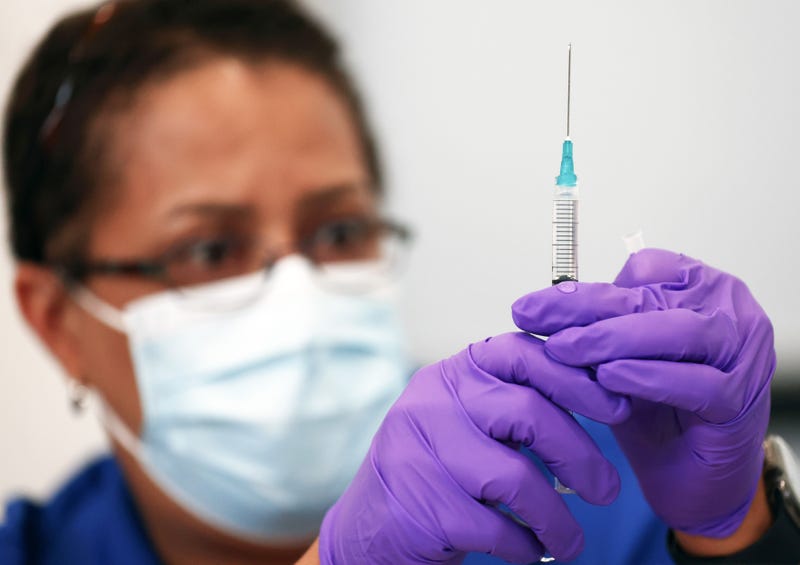
The FDA has now authorized “booster” doses of the Pfizer or Moderna COVID-19 vaccine for immunocompromised people.
The specific group of those that are recommended to receive a booster include solid organ transplant recipients or those who are diagnosed with conditions that are considered to have an equivalent level of immunocompromise.
Listen to your favorite News/Talk station now on Audacy
The Centers for Disease Control and Prevention's Advisory Committee on Immunization Practices is scheduled to meet Friday to discuss further clinical recommendations regarding immunocompromised individuals.
For now, this does not apply to people who are not immunocompromised.
"The country has entered yet another wave of the COVID-19 pandemic, and the FDA is especially cognizant that immunocompromised people are particularly at risk for severe disease. After a thorough review of the available data, the FDA determined that this small, vulnerable group may benefit from a third dose of the Pfizer-BioNTech or Moderna Vaccines," said Acting FDA Commissioner Janet Woodcock, M.D.
"Today's action allows doctors to boost immunity in certain immunocompromised individuals who need extra protection from COVID-19. As we've previously stated, other individuals who are fully vaccinated are adequately protected and do not need an additional dose of COVID-19 vaccine at this time. The FDA is actively engaged in a science-based, rigorous process with our federal partners to consider whether an additional dose may be needed in the future."
The Pfizer vaccine is currently authorized for emergency use in individuals ages 12 and older, and the Moderna vaccine is authorized for emergency use in individuals ages 18 and older. Both vaccines are administered as a series of two shots. The FDA did not address anyone who received the single-dose J&J shot.
Speaking to John Hines on the WCCO Thursday, Dr. Michael Osterholm, Director of the Center for Infectious Disease Research and Policy at the University of Minnesota said they’re continuing to study the effectiveness of the vaccines.
“Right right now, we're learning more about these vaccines, but let me be really clear,” Osterholm says. “We're not learning about safety.
The safety issues have been well-defined and we know the safety of these vaccines. And the fact that getting infected is much, much, much more dangerous than anything that could happen as a side effect of the vaccine. So what we're learning though is how long does a series of the vaccine protect you?”
Osterholm also adds that we do need to be concerned not just with vaccines in the United States, but the demand for them around the world.
“It's going to be taken into account what's happening globally,” Osterholm told WCCO. “Remember there are 6.4 billion people that live in low and middle-income countries of this world that don't have access to vaccine. Only 2% of that population has that access. We want to protect our vaccines from these new variants, these mutated viruses."
He continued, "Sure. We'll be concerned about how much transmission occurs in the U.S. but the big risk is going to continue to be in low and middle-income countries. And if we want to make sure that our vaccines stay effective, we need to stop transmission there, which means we're going to have to move the virus doses there. So the World Health Organization has asked countries not to do booster doses at least through September so that we can get more people vaccinated in low and middle-income countries, and try to reduce the transmission there."
"So while that's the humanitarian issue, obviously it’s also a very strategic issue. We don't do ourselves any good if there's widespread transmission in low and middle-income countries. And that's where these new variants come from that could actually challenge how well our vaccines work.”
LISTEN on the Audacy App
Sign Up and Follow Audacy
Facebook | Twitter | Instagram

